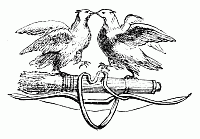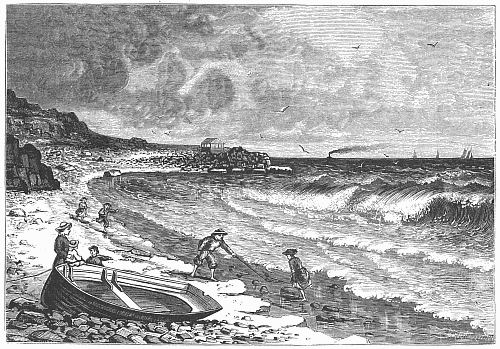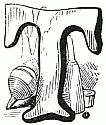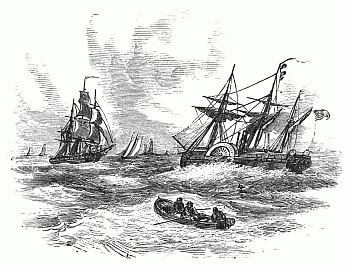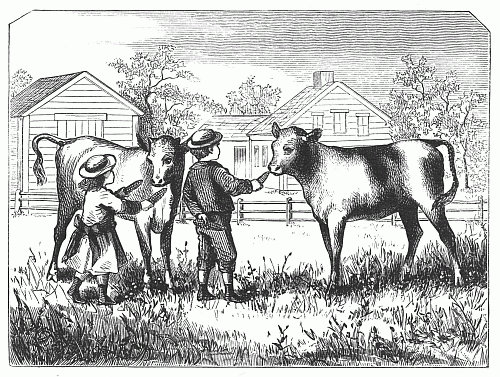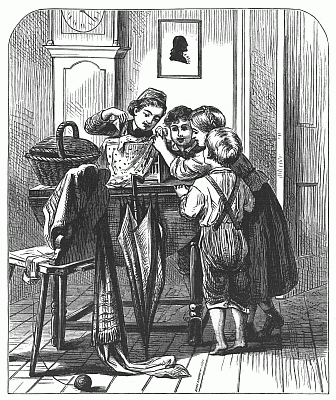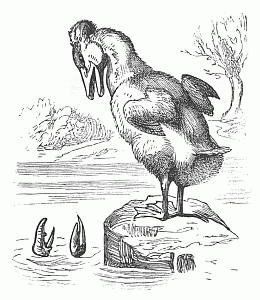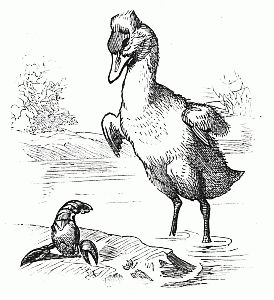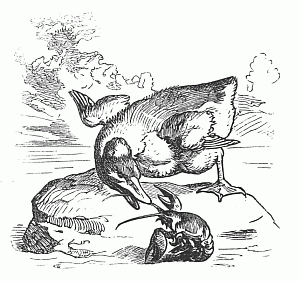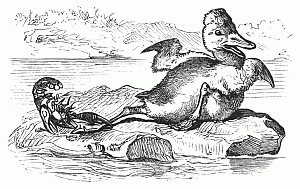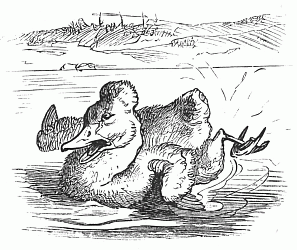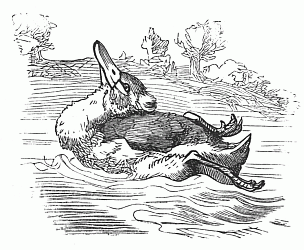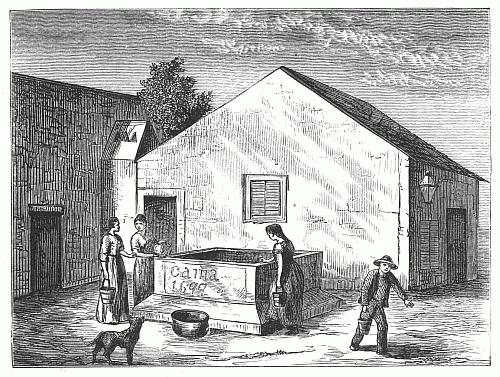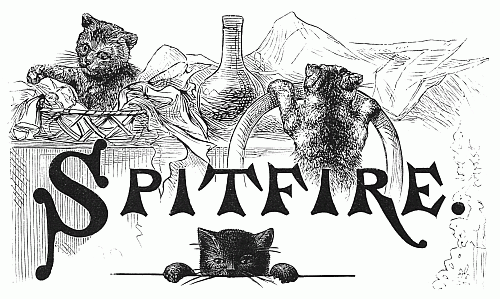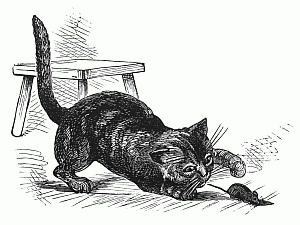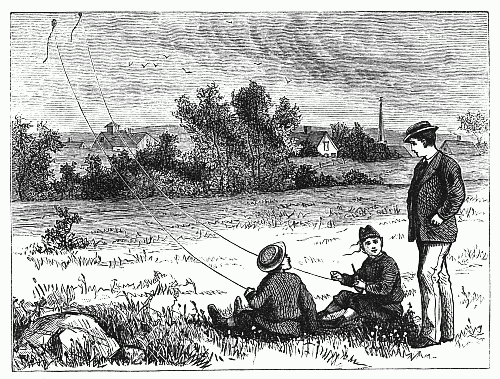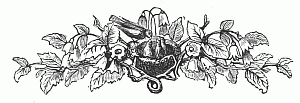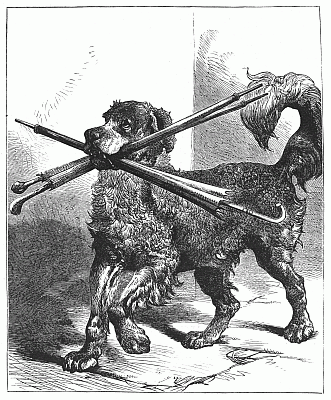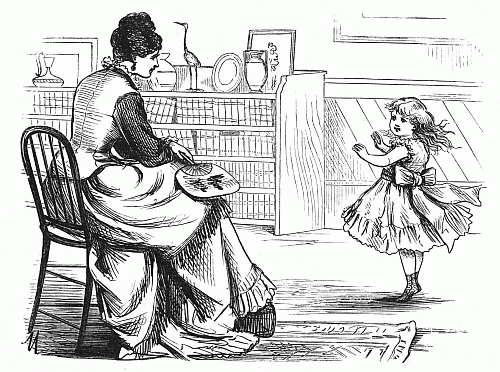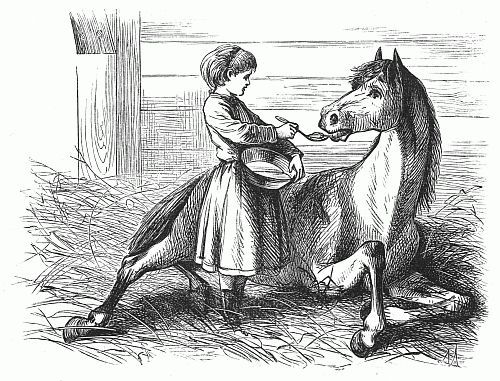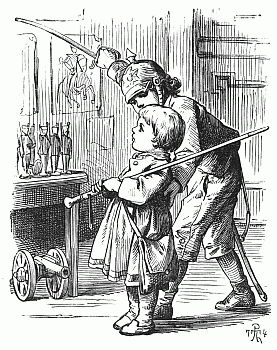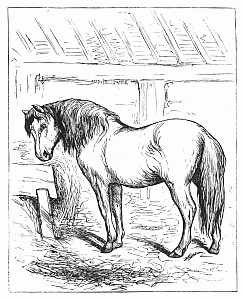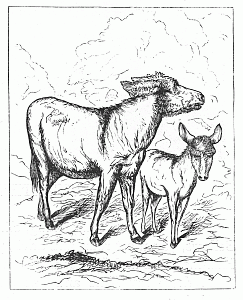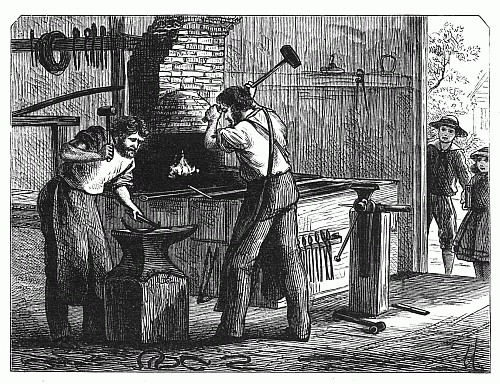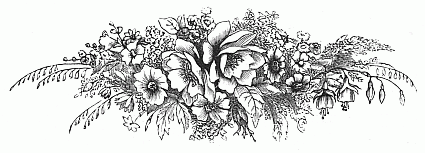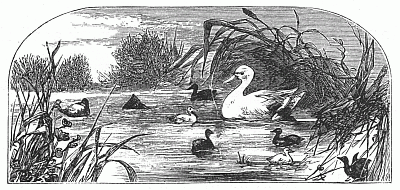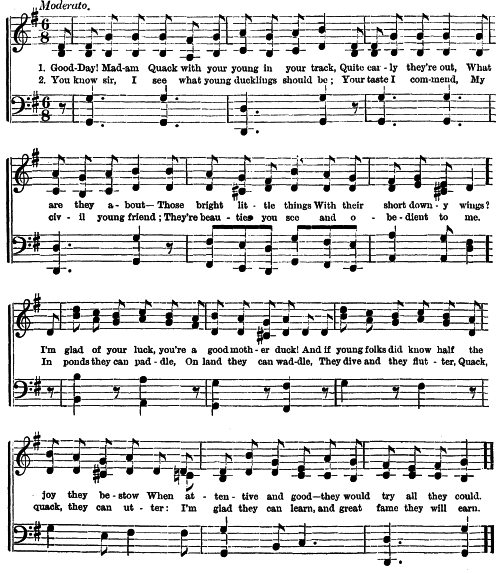Project Gutenberg's The Nursery, August 1877, Vol. Vol. XXII, No. 2, by Various
This eBook is for the use of anyone anywhere at no cost and with
almost no restrictions whatsoever. You may copy it, give it away or
re-use it under the terms of the Project Gutenberg License included
with this eBook or online at www.gutenberg.org
Title: The Nursery, August 1877, Vol. XXII, No. 2
A Monthly Magazine for Youngest Readers
Author: Various
Release Date: February 20, 2009 [EBook #28136]
Language: English
Character set encoding: ISO-8859-1
*** START OF THIS PROJECT GUTENBERG EBOOK THE NURSERY, AUGUST 1877 ***
Produced by Emmy, Juliet Sutherland and the Online
Distributed Proofreading Team at http://www.pgdp.net. Music
by Linda Cantoni.
THE
NURSERY
A Monthly Magazine
For Youngest Readers.
VOLUME XXII.—No. 2.
BOSTON:
JOHN L. SHOREY, No. 36 BROMFIELD STREET,
1877.
Entered according to Act of Congress, in the year 1877, by
JOHN L. SHOREY,
In the Office of the Librarian of Congress at Washington.
FRANKLIN PRESS:
RAND, AVERY, AND COMPANY,
117 FRANKLIN STREET,
BOSTON.
IN PROSE.
| | PAGE |
| A Day at the Beach | 33 |
| Buttercup and Daisy | 37 |
| Aunt Mary's Bullfinch | 38 |
| The poor Man's Well | 43 |
| Spitfire | 45 |
| Drawing-Lesson | 49 |
| "Great I and little you" | 50 |
| Our Dog Tasso | 53 |
| My Pets | 56 |
| Drilling the Troops | 59 |
| The Picture-Book | 60 |
IN VERSE.
| | PAGE |
| Bumble-Bee | 36 |
| King Drake | 40 |
| The Cosset-Calf | 48 |
| Primer and Slate | 48 |
| Making Cheeses | 54 |
| A Blacksmith's Song | 62 |
| Madam Quack (with music) | 64 |
[33]
[34]
A DAY AT THE BEACH.
HERE are few of the little readers of "The
Nursery" who could not tell of pleasant days
spent among green fields and woods, or on the
seashore. But in almost every large city, there
are many children who have never been out of
sight of brick walls.
Their homes are in close rooms in narrow streets, and
there they live from one year's end to the other. In winter
they are often pinched with cold. In summer they suffer
even more from the heat. You may see them at windows
and doors, or on hot sidewalks, trying to get a breath of
fresh air. It is not pure air, but the best they can get.
What I am going to tell you is about two of those poor
children. One is a little girl, nine years old, whom we will
call Jane. The other, who is only eight years old, is her
brother George.
Both children go to a Sunday school, and have for their
teacher a kind lady, who takes great interest in them. One
warm summer day, to their great delight, this lady, whom
we will name Miss White, called for them to go with her on
a trip to the seashore.
Dressed in the best clothes they could muster, they were
soon on board the steamboat. Here every thing was new
to them. As the boat steamed down the harbor, it would
have been joy to anybody only to watch the happy expression
on their faces.
By and by the boat neared the land; and there the
children saw a wonderful sight. What do you suppose it
was? It was a cow quietly feeding on the shore. They
had never seen a cow before.
Then Jane got sight of an apple-tree, and George spied a[35]
man raking hay. Here was another new sensation. While
they were feasting their eyes on green fields, and inhaling
the sweet country air, the boat stopped at the wharf.
A few steps brought them to the beach; and there,
stretched before them, was the great wide ocean, with the
surf rolling in, and a cool sea-breeze blowing. Then their
joy knew no bounds. Miss White did not try to restrain
them; for she meant to give them at least one day of
perfect freedom.
So they roamed at will. How they dug wells in the
sand, how they flung stones into the water, how they picked
up shells and sea-weed, how they scrambled over the rocks,
it would take too much space to tell.
When they were well tired out, and began to be hungry,
Miss White opened a luncheon-box in a shady place among
the rocks, and gave them such a dinner as they had never
had before. Then their bliss was complete.
The day passed away almost too quickly, and the time
came to go back to the city. That seemed rather hard to
Jane and George. But they have the promise of another
excursion before the summer is over.
Jane Oliver.
[36]
BUMBLE-BEE.
The smartest of dandies is young Mr. Bee,
Who is known by the name of Bumble;
His life is a short one, but merry and free:
They're mistaken who call him "Humble."
Clad in black velvet, with trimmings of yellow,
He knows well enough he's a fine-looking fellow;
And, hiding away a sharp little dagger,
He dashes about with a confident swagger,
While to show he's at ease, and to tell of his coming,
A tune he is always carelessly humming.
Eating or drinking, or looking for pleasure
Fit for the tastes of a person of leisure,
Down where the meadow is sunny and breezy,
In the red clover, he takes the world easy;
Or, feeling the need of a little diversion,
He makes to the garden a pleasant excursion,
And into a lily or hollyhock dodging
|
With quiet assurance he takes up his lodging.
With a snug little fortune invested in honey,
Young Bumble Bee lives like a prince, on his money,
And, scorning some plodding relations of his, he
Leaves hard labor to them,—his cousins named "Busy."
D. B. Barnard.
[37]
BUTTERCUP AND DAISY.
Dear little Readers of "The Nursery:"—I would like to
tell you a story about my little brother Clinton and myself.
We each have a nice little calf down at our grandpa's farm
in the country. One is a pure Alderney, grandpa says, and
is of a beautiful fawn color: the other is red and white.
Grandpa let us name them: so we called them Buttercup
and Daisy. Clinton's is Buttercup, and mine is Daisy.
They are both very kind and gentle. Both have cunning
little horns, just coming out of their heads; but they do not
hook little brother or me. In the picture you will see them
eating corn out of our hands.
At first we were afraid of their damp noses and rough
tongues; but we soon got over that, and now feed them
every time we go to the farm.[38]
Papa tried to have the little Alderney give us a ride on
its back; but, as soon as we were well on, the calf kicked up
its heels and ran away, saying, "Bah!" and leaving brother
and me on our backs on the soft turf. We were not hurt
at all, but had a good laugh.
Buttercup soon came back for more corn; and uncle said,
"Give it to her in the ear;" but I said I thought her mouth
was the best place to put it in. Then uncle laughed, and
said that was a joke. Do you know what he meant?
Harry C. Mather.
AUNT MARY'S BULLFINCH.
"Now be sure and not frighten it, children," said Aunt
Mary as she left the room.
John and Lucy lifted the handkerchief from the cage,
while Paul and Richard, with anxious eyes, stood by to get
a sight of the piping bullfinch, of which they had heard so
much.
This little bird had been presented to Aunt Mary by a
German lady to whom she had been kind. It could whistle
two or three tunes in a way to surprise all hearers. While
the children were looking at it, it began to pipe.
"I know that tune," cried Richard. "It is 'Coming
through the rye!'"
"And now the tune changes to 'Merrily every bosom
boundeth,'" said Lucy. "What a wonderful little bird!"
"But how did it learn to whistle these tunes?" asked
Paul.
Aunt Mary, coming in at that moment, explained to the
children that in some of the small towns of Germany are[39]
persons who teach these little birds. It takes about a year
for a bullfinch to learn a tune. But some of them learn
more quickly than others: so it is with some children.
The birds are at first kept in a dark room; and when
they are fed, a tune is played or whistled. They associate
this tune with the act of feeding; and gradually seem to
find out what is wanted of them.
The price of a bird that can pipe a tune in good style is
from fifty to one hundred dollars. A good deal of time and[40]
trouble has to be spent in teaching the birds. Sometimes a
child is employed to play a tune on a little hand-organ; and
this the little bird learns after hearing it many times.
When the bullfinch learns well, he is praised and petted,
and this he seems to enjoy very much. Even birds, you
see, like to be praised and petted.
Dora Burnside.
KING DRAKE.
"I'm king of the rock," said a silly old drake;
"And no one must dare my claim to partake.
I shall punish severely whoever comes near
Without my permission: let all the world hear!"
But out of the water, on the rock as he stands,
Comes up, as if praying, what seemed like two hands.
"Ah! here is a subject already for me!
Come, my son, and fear nothing, I'll spare you," said he.
[41]
But his majesty starts as if from a shock,
When he sees a big lobster make a bow on the rock.
"That is well," said the king; "but consider, my son,
This rock is my throne, and is only for one."
The lobster, however, is slow to obey;
He spreads himself out; he will not go away.
"Are you deaf?" cries King Drake, "go, pigmy! Get down!
How dare you thus brave a drake of renown?"
[42]
But the lobster, at this, nips King Drake in the leg.
"Oh, loosen your claw! Let go! Oh! I beg."
Tighter pinches the claw: "Rebellion! help! hear!
King Drake is in trouble: is nobody near?"
In vain are his kicks; his cries are in vain:
The lobster clings fast, in spite of the pain;
Nor lets go his hold till they get to the bank:
Then the king waddles home, giving up throne and rank.
From the German.
[43]
THE POOR MAN'S WELL.
Among the Azores, is situated the beautiful Island of
Fayal, with its orange-groves and profusion of flowers.
But, notwithstanding the fruit and flowers, there is one
thing which Americans who live there miss sadly, and that
is fresh, cool water. There are no lakes or ponds, such
as we have here; and so the people have to use rain-water,
which they save in large tanks or cisterns.
There are a few wells on the island, which, as the water
rises and falls in them twice in every twenty-four hours,
are called "tide-wells." But there was a time, many years
ago, when the people had neither cisterns nor wells, and
were obliged to get water from hollows in the rocks. And
this is the story of the first well.
The year 1699 was a year when scarcely any rain fell.
The grain did not grow, the cows and sheep died from thirst,
and many of the poor people also. Now there was a very
rich man on the island, who had come here to live many
years before, from another part of the world.
Though he was so rich, and might have done much good
with his money, he was so stingy and so hard, that the
people did not love him at all. But his bags of silver and
gold did not buy him water; and at last the thought came
to him, "Why! I will dig a well, as people used to do in
my country. I will dig it on my own land, and no one
shall have a drop of the water but myself."
So he hired men to come and dig the well; but he paid
them only a little money, and was very unkind to them.
They dug and they dug; but no water came. At last they
said they would work no longer unless their master would
promise them some of the water, and he promised them the
use of the well for half of every day.[44]
Now they dug with more patience; and one morning, as
early as six o'clock, they suddenly found water. They
claimed the privilege of using the well for the first six
hours; and the master dared not refuse. As they were
drawing the water, they noticed that it began to grow
lower and lower in the well; and at twelve o'clock, the
master's hour, none was left.
He was very, very angry, and said he would never give
the men any work again. However, at six o'clock that
night, they again demanded the use of the well. He
mockingly asked them if they expected the water would
come for them, and not for him. Nevertheless they went
to the well; and, to the master's awe and wonder, it was
full of water.
At midnight, the master again tried to get water from
the well, and, as before, found it empty. He now felt[45]
afraid, believing that some divine power controlled the
action of the water. He went to the church and vowed,
before God, that if the water should come again next
morning, he would dedicate it to the poor forever.
In the morning, when the men visited the well, there
was the fresh water awaiting them. The master kept his
vow, and thus the well became "The Poor Man's Well."
To this day the water rises and falls in it twice in every
twenty-four hours. I give you here a picture of the well,
and should you ever go to Fayal you may see the original.
K. H. S.
Can you guess what she was? She was a little black
kitten; and I must tell you all about her, and why we gave
her such a funny name. Teddikins had a great mouse-colored
cat called Maltie, and she had three little kitties,—Spitfire,
Miss Tittens, and Cuddle. Spitfire was all black,
just as black as a lump of coal, while Miss Tittens was gray,
and Cuddle was gray and white.[46]
The first time Teddikins and I looked into the box where
Maltie and her kitties were, they were very, very little, and
their eyes were not open. The black kitty was lying on top
of the others; and Teddikins put in his little fat hand and
picked her up. What do you suppose she did? She said,
"Sptss!" and she kept on saying, "Sptss" until Teddikins
put her down again; and so we called her Spitfire.
Just as soon as she could see out of her funny little gray
eyes, she began to try to get out of the box. She wanted
to see what there was outside, where Maltie went. She
would climb up a little way, and then tumble back on Miss
Tittens and Cuddle, which would make them say, "Mew,"
and make Teddikins laugh; but Spitfire always said, "Sptss!"
and would try again.
At last, one day we heard a thump; and we looked
around, and there was Spitfire on the floor. She had
climbed to the top of the box, and tumbled over the edge,
and there she stood, with her tail straight in the air, and
her legs wide apart, looking at us, and saying, "Sptss!"
Maltie was very proud of her kitties, and used to take
Cuddle and Miss Tittens in her mouth, and carry them into
the dining-room when we were eating our breakfast, to
show them to us. But Spitfire would not let her mamma
carry her. She would walk in all alone, tumbling over on
her little nose very often (for her legs were not yet strong),
but carrying her little black tail just as straight as little
boys carry sticks when they call them guns.
One morning, Teddikins put a saucer of milk on the floor
and what do you suppose that little Spitfire did? Why,
she looked at it very hard, and then she said, "Sptss," and
walked right into the milk, and out the other side of the
saucer, with Tittens and Cuddle after her. The floor was
covered with the funny white prints of their little paws.[47]
One day a mouse ran across the kitchen; and Cuddle and
Tittens were very much frightened; but Spitfire humped
up her back, and made her tail very big, and said "Sptss!"
very hard, and then cantered off sideways staring at the
mouse, and saying, "Sptss!" all the time.
You know how kitties like to go to sleep, all cuddled up
together. But Spitfire would not lie down with the others:
she always tried to get on top of them.
When the little kitties were quite strong, they used to
play a funny sort of game. There was a round foot-stool,
covered with carpet, and Spitfire used to sit up on it, and
then Cuddle and Miss Tittens would try to climb up the
sides. Then Spitfire would say, "Sptss!" and pat them on
the heads with her little paws until they rolled down again.
Sometimes, when she was busy driving one off, another
would get up behind her, and drive her off too; but she
always worked hard until she was up again.
Do you not think she was a funny kitty? She always
went first, and took the lead, and used to box the ears of
Cuddle and Tittens when they did not mind her. Now she
is a big black cat, with a red collar around her neck, and
she catches rats and mice, and is very good and useful.
She only says, "Sptss!" when strange cats come into her
yard; but we still call her Spitfire.
E. F.
[48]
THE COSSET-CALF.
When I was quite a little girl
I had a cosset-calf,
And, when it ran about the fields,
It always made me laugh.
It seemed as gentle as a lamb,
And from my hand was fed;
And how I grieved when first I felt
The horns upon its head!
It always answered to my call,
And thrust its wet nose through
The bars, and tried its very best
To say, "How do you do?"
I left it in the early fall,
And kissed my pet with tears;
For to a little child the months
Stretch out as long as years.
And when the summer came again,
I never shall forget
With what dismay I gazed upon
My former little pet.
I was afraid of those great horns,
So crooked on its brow,
Nor would believe my little calf
Was that enormous cow!
But soon I learned to know its face
And conquered my alarm,
And thought there was no nicer cow
On any other farm.
And oh the rich sweet milk she gave!
Why, just to make me laugh,
My mother used to call me then
Her little cosset-calf!
Josephine Pollard.
PRIMER AND SLATE.
Primer and slate, primer and slate!
Hurry up, mother! I fear I am late.
A, B, C, D, and 1, 2, 3, 4,
Must be studied, so I can recite them once more.
Primer and slate, primer and slate,
Must be carefully conned if we hope to be great:
A man cannot hope much of a man to be,
Unless, when a boy, he has learned A, B, C.
Uncle Theo.
[49]
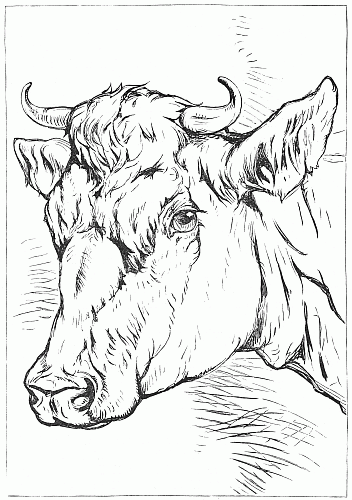 DRAWING-LESSON BY HARRISON WEIR.
DRAWING-LESSON BY HARRISON WEIR.
[50]
"GREAT I AND LITTLE YOU."
"How do you like that little new neighbor of yours?"
asked Herbert Greene's big brother, who had seen the two
little boys playing together in the yard.
"Oh, you must mean Georgie Worthman," said Herbie.
"Why, I don't know. I like him, and I don't like him."
Wallace laughed. "Then you quarrel a little sometimes,"
said he. "Is that it?"
"No, we don't quarrel," said Herbie. "I don't let him
know when I'm mad with him."
"What does he do to make you mad with him?" asked
Wallace.
"Oh, he says things," said Herbie.
"Such as what?"
"Well, he looks at my marbles, and says, 'Is that all
you've got? I have five times as many as that,—splendid
ones, too. They'd knock those all to smash.'"
"Ah, I see!" said Wallace. "It is a clear case of 'great
I and little you.'"
"What do you mean by that?" said Herbie.
"Well, if you don't find out by Saturday night, I'll tell
you," said Wallace. This was on Monday.
On Wednesday afternoon Herbie was out at play, and
presently Georgie Worthman came out. Wallace was in
his room, reading, with the windows open, and could hear
all that was said.
Georgie brought his kite with him, and asked Herbie if
he would go to the common with him to fly his kite.
"Oh, yes! if mother is willing," said Herbie. "But
where did you get that kite?—made it yourself, didn't
you? I've got one ever so much bigger than that, with[51]
yards and yards of tail, and, when we let it out, it goes out
of sight quick,—now, I tell you!"
"This isn't the best I can make," said Georgie; "but if
I had a bigger one I couldn't pitch it, or hold it after it
was up."
"Pooh! I could hold one that pulled like ten horses,"
said Herbie; and he ran in to ask his mother if he could go
with Georgie to the common.
His mother was willing if Wallace would go too; and so,
after a little good-natured bothering, and pretending he did
not want to go, Wallace took his hat, and Herbie got his
kite and twine, and the three boys set off for the common.
Georgie's kite was pitched first, and went up in fine style.
Then Herbie's went off, and soon passed it, for it had a
longer string; and both were far up in the dazzling blue of
the sky.[52]
"There now!" said Herbie, "didn't I tell you my kite
would beat yours all to nothing? I bet there isn't another
kite in town that will begin to be a match for it!"
"How is this? How is this?" said Wallace. "Seems to
me 'great I and little you' are around here pretty thick."
"What do you mean by that?" said both the little boys.
"Why, when a fellow says that he has got the best
marbles, and the best kite, and the swiftest sled, and the
handsomest velocipede, and the most knowing dog, anywhere
in town, we say his talk is all 'great I and little
you.' That is, we mean he is always bragging; and a
braggart is a very disagreeable person," said Wallace.
Herbie looked at Georgie, and both blushed a little. The
boys had great fun with their kites; and when they got
home, and Wallace and Herbie went up stairs to put away
the kite, Herbie said, "Well, my kite did beat Georgie's,
just as I told him it would."
"That is true," said Wallace; "but you said the other
day that you liked Georgie, and didn't like him, because
he was always telling how much bigger and better his
things were than yours; and now, to-day, you were making
yourself disagreeable to him by bragging about your kite.
Now, if you want the boys to like you, my lad, you must
give up talking 'great I and little you,' for it is not sensible
nor kind."
So Herbie found out what Wallace meant, and he said to
himself, "I don't mean to let the fellows hear me talking,
'great I and little you' any more."
H. W.
[53]
OUR DOG TASSO.
Tasso is a big black dog. His back comes up almost to
the top of a dining-table. He does not look as though he
could ever have been carried about in a handkerchief; but,
when he was a puppy, he was brought home in that way
by a young lady as a present to her brothers.[54]
Tasso seems to take delight in making himself useful.
When there is work to be done, he always wants to do his
part. He brings in wood, stick by stick, and puts it in the
wood-box, never stopping till the box is full. While he
is carrying in the wood, the boys fill the chip-basket; and
then Tasso takes that in his mouth, and puts it in its place
beside the wood-box.
If any of the family has a basket or a bag to take to the
station, Tasso always insists on taking it. One rainy day,
we sent him to the station with three umbrellas, and he
delivered them all safely. One day his master went out to
the barn without his hat. Tasso did not think this was
proper: so he took the hat in his mouth and carried it out
to him.
I could tell you many other amusing things about Tasso.
He is always attentive and obedient, and every one who
knows him loves him and trusts him.
F. A. S.
MAKING CHEESES.
"Does the little fairy
Work in a dairy?
I hear her talk about making cheese,—
She with her locks the color of money,
Hanging long and crinkled and sunny
Down to her waist,—a golden fleece."
Oh, such a laughter
As rings out after
[55]My words, is the sweetest sound I know!
Sparkle the eyes that had been dreaming:—
"Aunty dear, if you want to see me,
I'll show you how to make one,—so!"
Soon as she utters
This, out she flutters,
Her full fresh frock as white as the snows;
Round she whirls, and then in a minute
Sits down quick, and the air within it
Puffs it out like a full-blown rose.
That's what she pleases
To call "making cheeses."
I'm sure I could give it a better name.
Call it playing at daffy-down-dilly,
Call it playing at white day-lily:
[56]Either will suit me just the same.
Lily for brightness
She is, and for whiteness;
A golden centre her long locks grow!
And isn't that head, so shimmering, sunny,
Daffy-down-dilly-like, yellow as money?—
Rogue she is anyway,
that I know.
Mrs. Clara Doty Bates.
MY PETS.
I am a little girl seven years old. I live way up in the
woods of Maine, in the little town of Howland, forty miles
from anywhere. Now you may wonder how I can amuse
myself, so far away from the world: so I am going to tell
you.
I live on a great farm, with grandpapa, Aunt Peeps, and
Nan, and Will. I have a pair of top-boots, so I can play
out doors in wet weather. I was glad when grandpapa
brought them home; and the first thing I did was to find
a good large mud-puddle, and oh! didn't I have fun, splashing
right through it!
I drive old Frank whenever I please; and then, when we
get home, I feed him on apples and bread. He is twenty
years old, and has no teeth to eat hay with, and grandpapa
says he would starve to death if it were not for me.
We let him go wherever he likes, and in hot weather he
stays on the barn-floor, out of the reach of the flies, most of
the time. He lets me card him, and he never kicks me.
One day last summer, Emma and I got old Frank upon a
haymow, about four feet from the floor, and there he lay
down on his side, and took a nap. Then I brought out a[57]
pan of meal and water, and fed it to him with an iron
spoon.
I have an old pet sheep too. It will run out from the
flock any time when it sees me coming, and follow me to
the house. One day I heard a noise against the kitchen-door,
and, when I opened it, my sheep came in, and followed
me right into the dining-room, and would not go out till I
gave it some potatoes.
Major and Velvet Paw are my pet cats, and Peep is my
German canary-bird; and I had a pet chicken, but grandpapa
stepped on it one day. He says he would rather have
lost the best cow in the barn than have killed my chicken.
William says he will give me four eggs in the spring, and
then, perhaps, I can have four chickens instead of one.
I have a bear,—a black, fierce-eyed bear, that gnashes
his teeth, and growls, and stands up and shakes his paws at[58]
me; but he is not a real live bear. He has to be wound
up with a key before he will growl. We have live bears
here in the woods, though: they come right into our yard,
and eat our sheep. We set a trap for one last fall, close to
the house, and a bear was caught in it.
I have a wax doll almost as large as a real baby. I have
named it Gretchen. Cousin Mary brought it to me from
Germany. It has flaxen curls, and six of the prettiest little
pearl teeth, and it goes to sleep, and says papa and mamma,
and whines, and cries. I wonder if any of you little girls
have such a beautiful dolly.
My doll, Rosie Deben, is six years old, and almost as
large as I am. I wash her whenever I like, and about once
a year Auntie Peeps paints her face over. I like Rosie for
an every-day doll, because I can wash her hands and face,
and undress her, and if she tumbles out of her wagon it only
bumps her head, and bruises her nose. She has tumbled
down stairs ever so many times.
I have no little girls to play with; but there is a little
boy who comes to see me sometimes: his name is Percy,
and we go fishing down at the brook, and we catch little
bits of fish with pin hooks.
I went to school last summer, and read in my "Nursery,"
and Nan said I learned nicely. There were only four
scholars,—one for each corner of the room; and we had a
little rocking-chair to sit in.
Nan thinks I have told you enough about my pets this
time, and I will bid you good-by.
Mamie.
[59]
DRILLING THE TROOPS.
Here is Corporal Hans drilling a squad under the eye of
his superior officer, Captain Ernest. The corporal is a
brave soldier. Anybody could tell that by his looks. But
he does not give his orders quite sternly enough to suit the
captain, who is teaching him how to do it.
It makes a man of peace shudder to see the corporal
stand so calmly right at the mouth of a cannon. What if
the cannon should go off! But these military men get used
to such things. I don't suppose now that one of that whole
squad could be frightened into running away. They will
not move till they hear the word of command.
Uncle Sam.
[60]
THE PICTURE-BOOK.
In the book that Mary likes
so much to look at, there is a
nice picture of a horse. Here
it is.
The horse
has a very
long tail and
also a long
thick mane.
He stands
very quietly
in his stall,
turning his
head around, as if he were in
want of some more hay. If he
should ask for it, what would
he say? Little Mary says he
would say, "Neigh!"
[61]
The next picture shows us
two donkeys,—an old one and
a young one. They have very
long ears, and look as if they
might hear
all that we
say.
The worst
we can say
of them or
their race is
that they are
homely, and
not so fleet
as the horse. But they are
very tough and strong and
patient.
If the donkey should hear
this, perhaps he would open his
mouth and say, "Bray!"
A. B. C.
[62]
A BLACKSMITH'S SONG.
Clang, cling, clang, cling!
Bellows, you must roar, and anvil, you must ring;
Hammer, you and I must work—for ding, dong, ding
Must dress my Kate and baby, and bread for us must bring.
So dong, ding, dong, ding!
Anvil, to my hammer make music while I sing,—
Clang, cling, clang, cling!
Clang, cling, clang, cling!
Oh, well I love my smithy when the birds in spring-time sing,
[63]And the pleasant sun comes streaming in, the sun that loves to bring
Its gladness to me, working, and to hear my anvil ring.
Dong, ding, dong, ding!
And to see my iron glowing, and the sparks in showers spring,—
Clang, cling, clang, cling!
Blow, blow, blow, blow!
Bellows, you must work till the furnace is aglow.
Snug is my old smithy when, without, comes down the snow,
When sooty wall and rafter in the blaze are all aglow.
Blow, blow, blow, blow!
What care I if the storm, then, without, be high or low?
Blow, blow, blow, blow!
Clang, cling, clang, cling!
Merrily the hours fly that hear my anvil ring;
And quick my evening chair and my evening meal they bring;
Then, while Kate works beside me, I'm as happy as a king.
Clang, cling, clang, cling!
God give me always health and strength to make my anvil ring:
Clang, cling, clang, cling!
W. C. Bennett.
[64]
MADAM QUACK.
Words from "The Nursery." Music by T. Crampton.
[Transcriber's Note: You can play this music (MIDI file) by clicking here.]
1. Good-Day! Madam Quack with your young in your track,
Quite early they're out,
What are they about—
Those bright little things
With their short downy wings?
I'm glad of your luck, you're a good mother duck!
And if young folks did know half the joy they bestow
When attentive and good—they would try all they could.
2. You know sir, I see what young ducklings should be;
Your taste I commend,
My civil young friend;
They're beauties you see and obedient to me.
In ponds they can paddle,
On land they can waddle,
They dive and they flutter,
Quack, quack, they can utter:
I'm glad they can learn, and great fame they will earn.
Transcriber's Notes
The July edition of the Nursery had a table of contents for the next
six issues of the year. This table was divided to cover each specific
issue. A title page copied from this same July edition was also used for
this number and the issue number added after the Volume number.
Page 38, closing single quotation mark added to text. (through the rye!'")
End of the Project Gutenberg EBook of The Nursery, August 1877, Vol. XXII,
No. 2, by Various
*** END OF THIS PROJECT GUTENBERG EBOOK THE NURSERY, AUGUST 1877 ***
***** This file should be named 28136-h.htm or 28136-h.zip *****
This and all associated files of various formats will be found in:
http://www.gutenberg.org/2/8/1/3/28136/
Produced by Emmy, Juliet Sutherland and the Online
Distributed Proofreading Team at http://www.pgdp.net. Music
by Linda Cantoni.
Updated editions will replace the previous one--the old editions
will be renamed.
Creating the works from public domain print editions means that no
one owns a United States copyright in these works, so the Foundation
(and you!) can copy and distribute it in the United States without
permission and without paying copyright royalties. Special rules,
set forth in the General Terms of Use part of this license, apply to
copying and distributing Project Gutenberg-tm electronic works to
protect the PROJECT GUTENBERG-tm concept and trademark. Project
Gutenberg is a registered trademark, and may not be used if you
charge for the eBooks, unless you receive specific permission. If you
do not charge anything for copies of this eBook, complying with the
rules is very easy. You may use this eBook for nearly any purpose
such as creation of derivative works, reports, performances and
research. They may be modified and printed and given away--you may do
practically ANYTHING with public domain eBooks. Redistribution is
subject to the trademark license, especially commercial
redistribution.
*** START: FULL LICENSE ***
THE FULL PROJECT GUTENBERG LICENSE
PLEASE READ THIS BEFORE YOU DISTRIBUTE OR USE THIS WORK
To protect the Project Gutenberg-tm mission of promoting the free
distribution of electronic works, by using or distributing this work
(or any other work associated in any way with the phrase "Project
Gutenberg"), you agree to comply with all the terms of the Full Project
Gutenberg-tm License (available with this file or online at
http://gutenberg.org/license).
Section 1. General Terms of Use and Redistributing Project Gutenberg-tm
electronic works
1.A. By reading or using any part of this Project Gutenberg-tm
electronic work, you indicate that you have read, understand, agree to
and accept all the terms of this license and intellectual property
(trademark/copyright) agreement. If you do not agree to abide by all
the terms of this agreement, you must cease using and return or destroy
all copies of Project Gutenberg-tm electronic works in your possession.
If you paid a fee for obtaining a copy of or access to a Project
Gutenberg-tm electronic work and you do not agree to be bound by the
terms of this agreement, you may obtain a refund from the person or
entity to whom you paid the fee as set forth in paragraph 1.E.8.
1.B. "Project Gutenberg" is a registered trademark. It may only be
used on or associated in any way with an electronic work by people who
agree to be bound by the terms of this agreement. There are a few
things that you can do with most Project Gutenberg-tm electronic works
even without complying with the full terms of this agreement. See
paragraph 1.C below. There are a lot of things you can do with Project
Gutenberg-tm electronic works if you follow the terms of this agreement
and help preserve free future access to Project Gutenberg-tm electronic
works. See paragraph 1.E below.
1.C. The Project Gutenberg Literary Archive Foundation ("the Foundation"
or PGLAF), owns a compilation copyright in the collection of Project
Gutenberg-tm electronic works. Nearly all the individual works in the
collection are in the public domain in the United States. If an
individual work is in the public domain in the United States and you are
located in the United States, we do not claim a right to prevent you from
copying, distributing, performing, displaying or creating derivative
works based on the work as long as all references to Project Gutenberg
are removed. Of course, we hope that you will support the Project
Gutenberg-tm mission of promoting free access to electronic works by
freely sharing Project Gutenberg-tm works in compliance with the terms of
this agreement for keeping the Project Gutenberg-tm name associated with
the work. You can easily comply with the terms of this agreement by
keeping this work in the same format with its attached full Project
Gutenberg-tm License when you share it without charge with others.
1.D. The copyright laws of the place where you are located also govern
what you can do with this work. Copyright laws in most countries are in
a constant state of change. If you are outside the United States, check
the laws of your country in addition to the terms of this agreement
before downloading, copying, displaying, performing, distributing or
creating derivative works based on this work or any other Project
Gutenberg-tm work. The Foundation makes no representations concerning
the copyright status of any work in any country outside the United
States.
1.E. Unless you have removed all references to Project Gutenberg:
1.E.1. The following sentence, with active links to, or other immediate
access to, the full Project Gutenberg-tm License must appear prominently
whenever any copy of a Project Gutenberg-tm work (any work on which the
phrase "Project Gutenberg" appears, or with which the phrase "Project
Gutenberg" is associated) is accessed, displayed, performed, viewed,
copied or distributed:
This eBook is for the use of anyone anywhere at no cost and with
almost no restrictions whatsoever. You may copy it, give it away or
re-use it under the terms of the Project Gutenberg License included
with this eBook or online at www.gutenberg.org
1.E.2. If an individual Project Gutenberg-tm electronic work is derived
from the public domain (does not contain a notice indicating that it is
posted with permission of the copyright holder), the work can be copied
and distributed to anyone in the United States without paying any fees
or charges. If you are redistributing or providing access to a work
with the phrase "Project Gutenberg" associated with or appearing on the
work, you must comply either with the requirements of paragraphs 1.E.1
through 1.E.7 or obtain permission for the use of the work and the
Project Gutenberg-tm trademark as set forth in paragraphs 1.E.8 or
1.E.9.
1.E.3. If an individual Project Gutenberg-tm electronic work is posted
with the permission of the copyright holder, your use and distribution
must comply with both paragraphs 1.E.1 through 1.E.7 and any additional
terms imposed by the copyright holder. Additional terms will be linked
to the Project Gutenberg-tm License for all works posted with the
permission of the copyright holder found at the beginning of this work.
1.E.4. Do not unlink or detach or remove the full Project Gutenberg-tm
License terms from this work, or any files containing a part of this
work or any other work associated with Project Gutenberg-tm.
1.E.5. Do not copy, display, perform, distribute or redistribute this
electronic work, or any part of this electronic work, without
prominently displaying the sentence set forth in paragraph 1.E.1 with
active links or immediate access to the full terms of the Project
Gutenberg-tm License.
1.E.6. You may convert to and distribute this work in any binary,
compressed, marked up, nonproprietary or proprietary form, including any
word processing or hypertext form. However, if you provide access to or
distribute copies of a Project Gutenberg-tm work in a format other than
"Plain Vanilla ASCII" or other format used in the official version
posted on the official Project Gutenberg-tm web site (www.gutenberg.org),
you must, at no additional cost, fee or expense to the user, provide a
copy, a means of exporting a copy, or a means of obtaining a copy upon
request, of the work in its original "Plain Vanilla ASCII" or other
form. Any alternate format must include the full Project Gutenberg-tm
License as specified in paragraph 1.E.1.
1.E.7. Do not charge a fee for access to, viewing, displaying,
performing, copying or distributing any Project Gutenberg-tm works
unless you comply with paragraph 1.E.8 or 1.E.9.
1.E.8. You may charge a reasonable fee for copies of or providing
access to or distributing Project Gutenberg-tm electronic works provided
that
- You pay a royalty fee of 20% of the gross profits you derive from
the use of Project Gutenberg-tm works calculated using the method
you already use to calculate your applicable taxes. The fee is
owed to the owner of the Project Gutenberg-tm trademark, but he
has agreed to donate royalties under this paragraph to the
Project Gutenberg Literary Archive Foundation. Royalty payments
must be paid within 60 days following each date on which you
prepare (or are legally required to prepare) your periodic tax
returns. Royalty payments should be clearly marked as such and
sent to the Project Gutenberg Literary Archive Foundation at the
address specified in Section 4, "Information about donations to
the Project Gutenberg Literary Archive Foundation."
- You provide a full refund of any money paid by a user who notifies
you in writing (or by e-mail) within 30 days of receipt that s/he
does not agree to the terms of the full Project Gutenberg-tm
License. You must require such a user to return or
destroy all copies of the works possessed in a physical medium
and discontinue all use of and all access to other copies of
Project Gutenberg-tm works.
- You provide, in accordance with paragraph 1.F.3, a full refund of any
money paid for a work or a replacement copy, if a defect in the
electronic work is discovered and reported to you within 90 days
of receipt of the work.
- You comply with all other terms of this agreement for free
distribution of Project Gutenberg-tm works.
1.E.9. If you wish to charge a fee or distribute a Project Gutenberg-tm
electronic work or group of works on different terms than are set
forth in this agreement, you must obtain permission in writing from
both the Project Gutenberg Literary Archive Foundation and Michael
Hart, the owner of the Project Gutenberg-tm trademark. Contact the
Foundation as set forth in Section 3 below.
1.F.
1.F.1. Project Gutenberg volunteers and employees expend considerable
effort to identify, do copyright research on, transcribe and proofread
public domain works in creating the Project Gutenberg-tm
collection. Despite these efforts, Project Gutenberg-tm electronic
works, and the medium on which they may be stored, may contain
"Defects," such as, but not limited to, incomplete, inaccurate or
corrupt data, transcription errors, a copyright or other intellectual
property infringement, a defective or damaged disk or other medium, a
computer virus, or computer codes that damage or cannot be read by
your equipment.
1.F.2. LIMITED WARRANTY, DISCLAIMER OF DAMAGES - Except for the "Right
of Replacement or Refund" described in paragraph 1.F.3, the Project
Gutenberg Literary Archive Foundation, the owner of the Project
Gutenberg-tm trademark, and any other party distributing a Project
Gutenberg-tm electronic work under this agreement, disclaim all
liability to you for damages, costs and expenses, including legal
fees. YOU AGREE THAT YOU HAVE NO REMEDIES FOR NEGLIGENCE, STRICT
LIABILITY, BREACH OF WARRANTY OR BREACH OF CONTRACT EXCEPT THOSE
PROVIDED IN PARAGRAPH F3. YOU AGREE THAT THE FOUNDATION, THE
TRADEMARK OWNER, AND ANY DISTRIBUTOR UNDER THIS AGREEMENT WILL NOT BE
LIABLE TO YOU FOR ACTUAL, DIRECT, INDIRECT, CONSEQUENTIAL, PUNITIVE OR
INCIDENTAL DAMAGES EVEN IF YOU GIVE NOTICE OF THE POSSIBILITY OF SUCH
DAMAGE.
1.F.3. LIMITED RIGHT OF REPLACEMENT OR REFUND - If you discover a
defect in this electronic work within 90 days of receiving it, you can
receive a refund of the money (if any) you paid for it by sending a
written explanation to the person you received the work from. If you
received the work on a physical medium, you must return the medium with
your written explanation. The person or entity that provided you with
the defective work may elect to provide a replacement copy in lieu of a
refund. If you received the work electronically, the person or entity
providing it to you may choose to give you a second opportunity to
receive the work electronically in lieu of a refund. If the second copy
is also defective, you may demand a refund in writing without further
opportunities to fix the problem.
1.F.4. Except for the limited right of replacement or refund set forth
in paragraph 1.F.3, this work is provided to you 'AS-IS' WITH NO OTHER
WARRANTIES OF ANY KIND, EXPRESS OR IMPLIED, INCLUDING BUT NOT LIMITED TO
WARRANTIES OF MERCHANTIBILITY OR FITNESS FOR ANY PURPOSE.
1.F.5. Some states do not allow disclaimers of certain implied
warranties or the exclusion or limitation of certain types of damages.
If any disclaimer or limitation set forth in this agreement violates the
law of the state applicable to this agreement, the agreement shall be
interpreted to make the maximum disclaimer or limitation permitted by
the applicable state law. The invalidity or unenforceability of any
provision of this agreement shall not void the remaining provisions.
1.F.6. INDEMNITY - You agree to indemnify and hold the Foundation, the
trademark owner, any agent or employee of the Foundation, anyone
providing copies of Project Gutenberg-tm electronic works in accordance
with this agreement, and any volunteers associated with the production,
promotion and distribution of Project Gutenberg-tm electronic works,
harmless from all liability, costs and expenses, including legal fees,
that arise directly or indirectly from any of the following which you do
or cause to occur: (a) distribution of this or any Project Gutenberg-tm
work, (b) alteration, modification, or additions or deletions to any
Project Gutenberg-tm work, and (c) any Defect you cause.
Section 2. Information about the Mission of Project Gutenberg-tm
Project Gutenberg-tm is synonymous with the free distribution of
electronic works in formats readable by the widest variety of computers
including obsolete, old, middle-aged and new computers. It exists
because of the efforts of hundreds of volunteers and donations from
people in all walks of life.
Volunteers and financial support to provide volunteers with the
assistance they need, are critical to reaching Project Gutenberg-tm's
goals and ensuring that the Project Gutenberg-tm collection will
remain freely available for generations to come. In 2001, the Project
Gutenberg Literary Archive Foundation was created to provide a secure
and permanent future for Project Gutenberg-tm and future generations.
To learn more about the Project Gutenberg Literary Archive Foundation
and how your efforts and donations can help, see Sections 3 and 4
and the Foundation web page at http://www.pglaf.org.
Section 3. Information about the Project Gutenberg Literary Archive
Foundation
The Project Gutenberg Literary Archive Foundation is a non profit
501(c)(3) educational corporation organized under the laws of the
state of Mississippi and granted tax exempt status by the Internal
Revenue Service. The Foundation's EIN or federal tax identification
number is 64-6221541. Its 501(c)(3) letter is posted at
http://pglaf.org/fundraising. Contributions to the Project Gutenberg
Literary Archive Foundation are tax deductible to the full extent
permitted by U.S. federal laws and your state's laws.
The Foundation's principal office is located at 4557 Melan Dr. S.
Fairbanks, AK, 99712., but its volunteers and employees are scattered
throughout numerous locations. Its business office is located at
809 North 1500 West, Salt Lake City, UT 84116, (801) 596-1887, email
business@pglaf.org. Email contact links and up to date contact
information can be found at the Foundation's web site and official
page at http://pglaf.org
For additional contact information:
Dr. Gregory B. Newby
Chief Executive and Director
gbnewby@pglaf.org
Section 4. Information about Donations to the Project Gutenberg
Literary Archive Foundation
Project Gutenberg-tm depends upon and cannot survive without wide
spread public support and donations to carry out its mission of
increasing the number of public domain and licensed works that can be
freely distributed in machine readable form accessible by the widest
array of equipment including outdated equipment. Many small donations
($1 to $5,000) are particularly important to maintaining tax exempt
status with the IRS.
The Foundation is committed to complying with the laws regulating
charities and charitable donations in all 50 states of the United
States. Compliance requirements are not uniform and it takes a
considerable effort, much paperwork and many fees to meet and keep up
with these requirements. We do not solicit donations in locations
where we have not received written confirmation of compliance. To
SEND DONATIONS or determine the status of compliance for any
particular state visit http://pglaf.org
While we cannot and do not solicit contributions from states where we
have not met the solicitation requirements, we know of no prohibition
against accepting unsolicited donations from donors in such states who
approach us with offers to donate.
International donations are gratefully accepted, but we cannot make
any statements concerning tax treatment of donations received from
outside the United States. U.S. laws alone swamp our small staff.
Please check the Project Gutenberg Web pages for current donation
methods and addresses. Donations are accepted in a number of other
ways including checks, online payments and credit card donations.
To donate, please visit: http://pglaf.org/donate
Section 5. General Information About Project Gutenberg-tm electronic
works.
Professor Michael S. Hart is the originator of the Project Gutenberg-tm
concept of a library of electronic works that could be freely shared
with anyone. For thirty years, he produced and distributed Project
Gutenberg-tm eBooks with only a loose network of volunteer support.
Project Gutenberg-tm eBooks are often created from several printed
editions, all of which are confirmed as Public Domain in the U.S.
unless a copyright notice is included. Thus, we do not necessarily
keep eBooks in compliance with any particular paper edition.
Most people start at our Web site which has the main PG search facility:
http://www.gutenberg.org
This Web site includes information about Project Gutenberg-tm,
including how to make donations to the Project Gutenberg Literary
Archive Foundation, how to help produce our new eBooks, and how to
subscribe to our email newsletter to hear about new eBooks.

